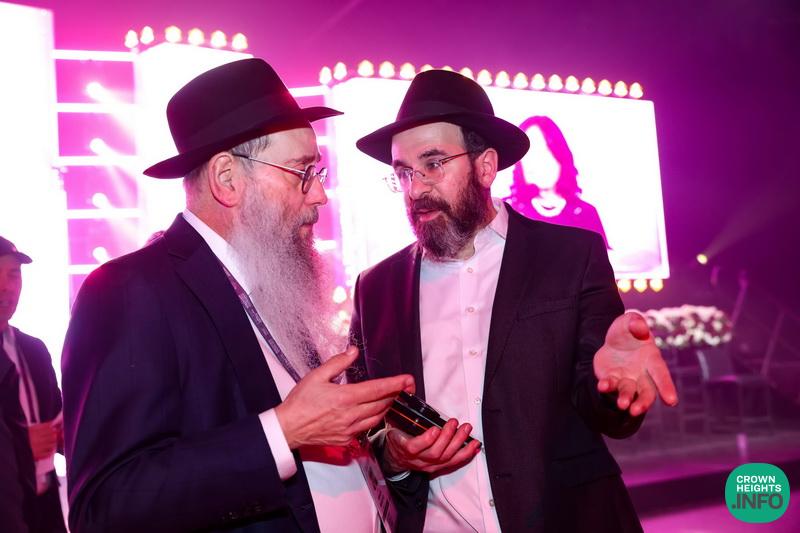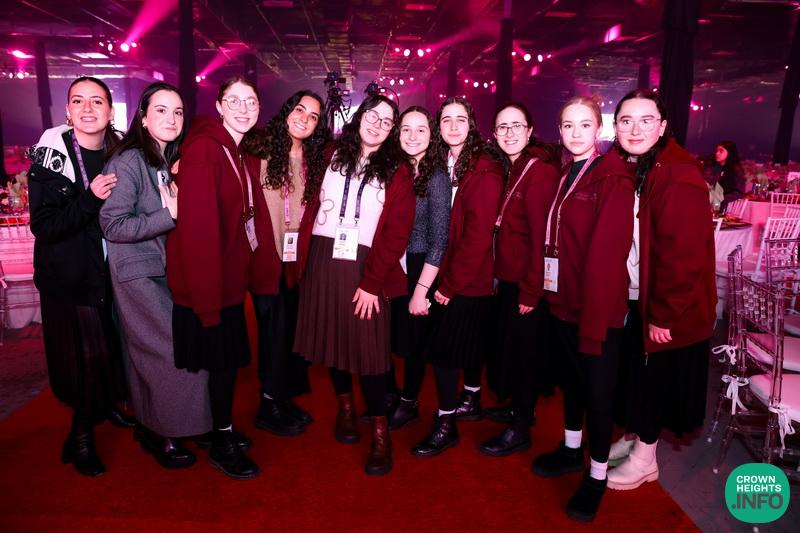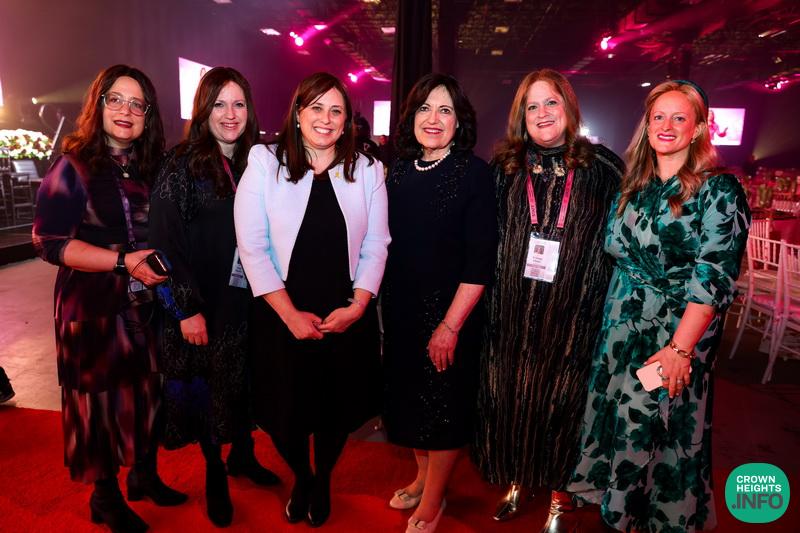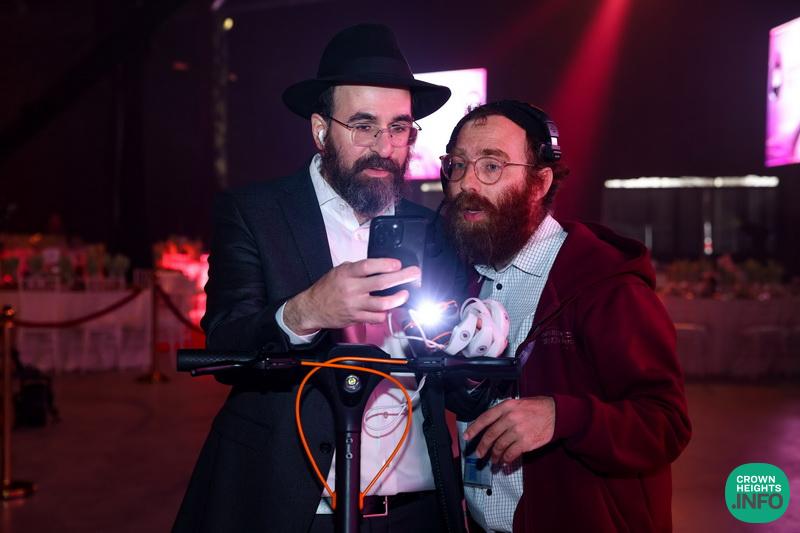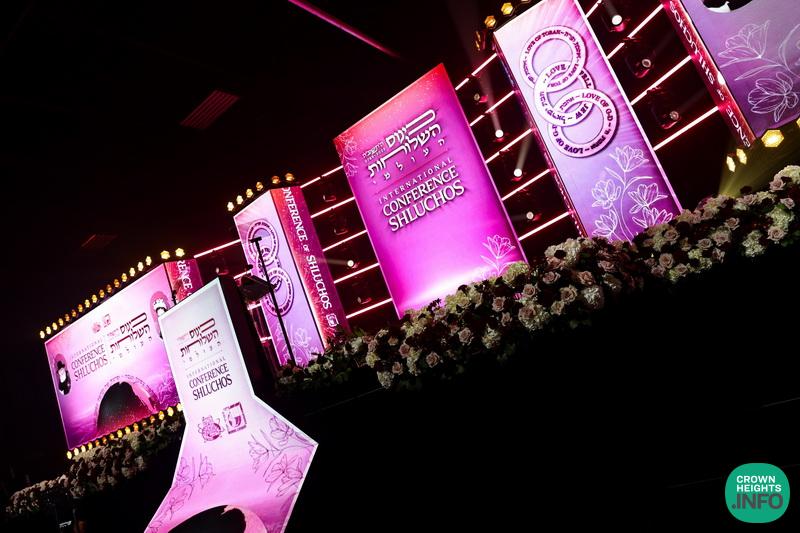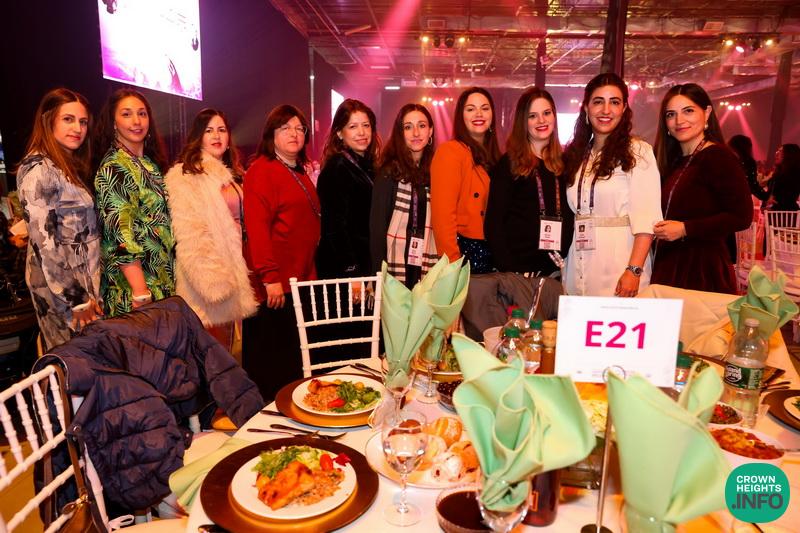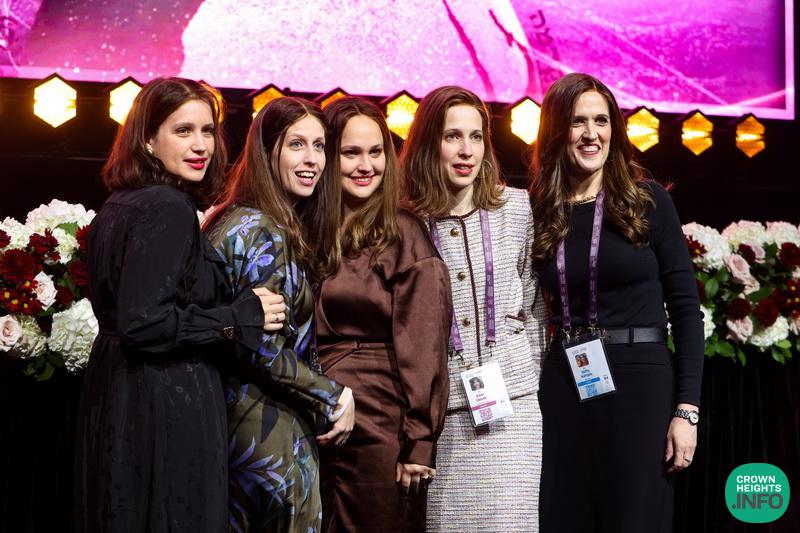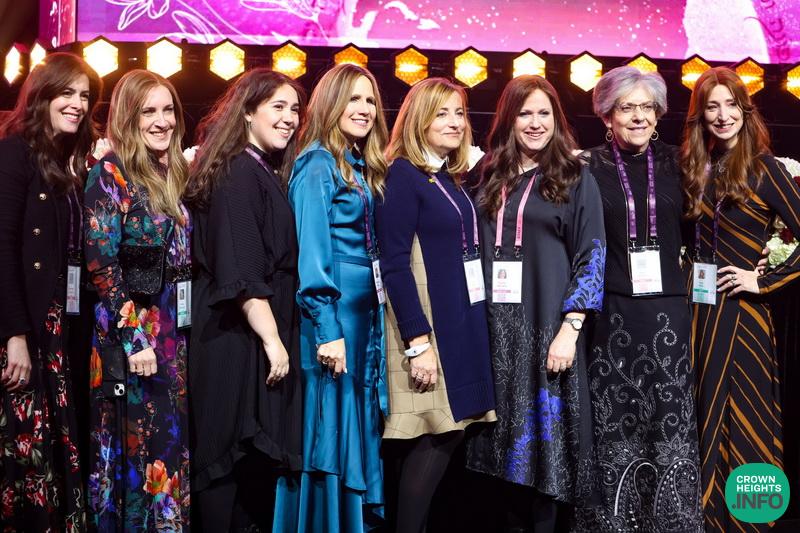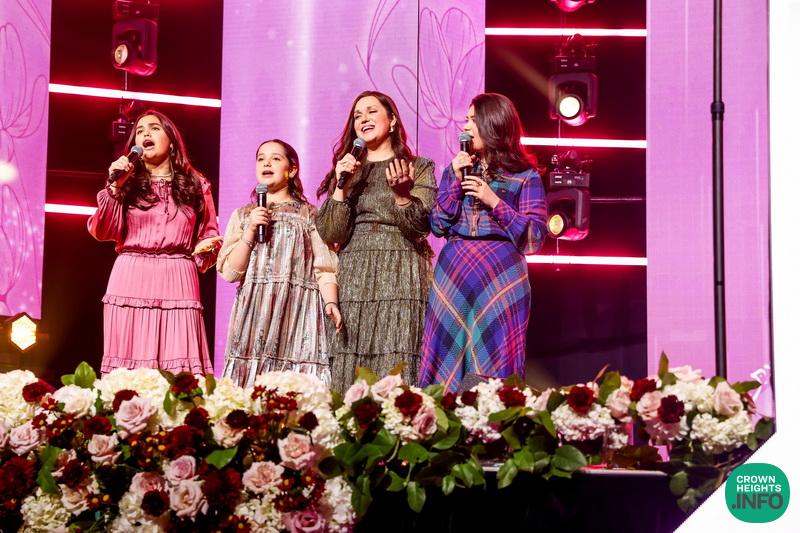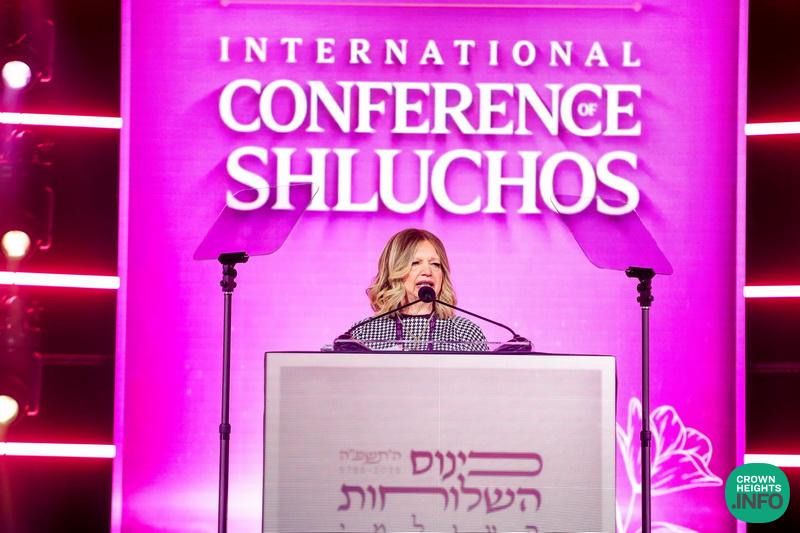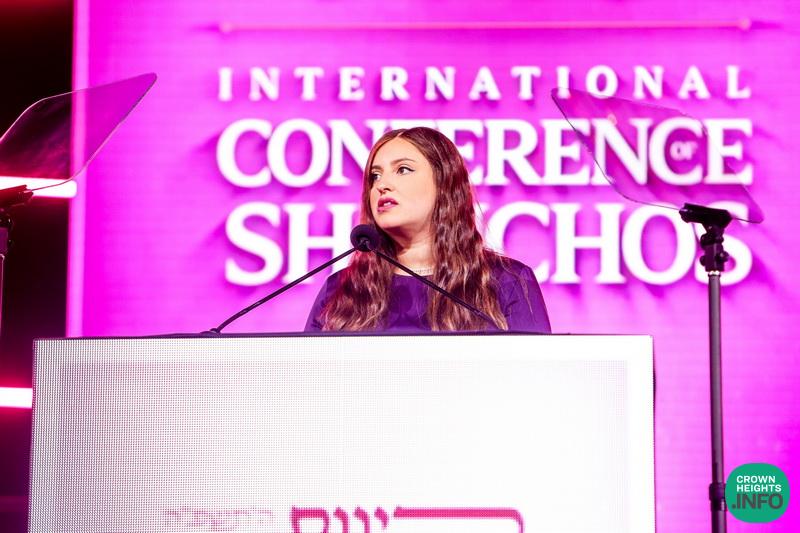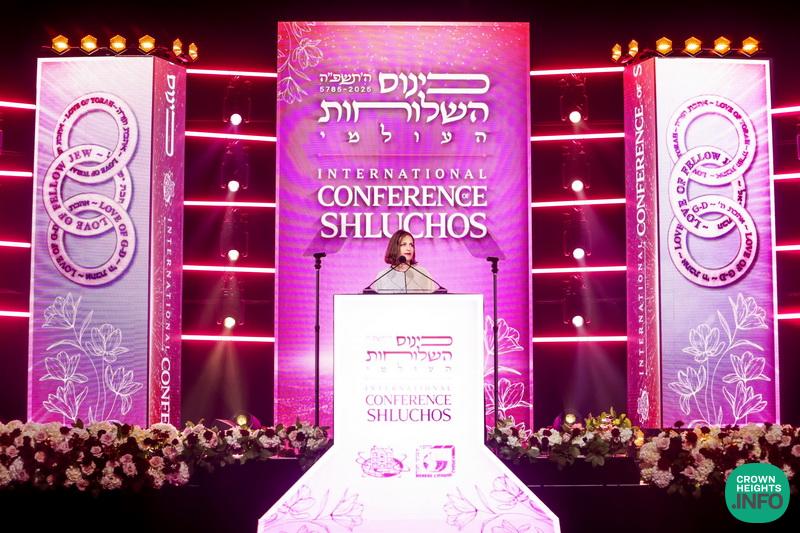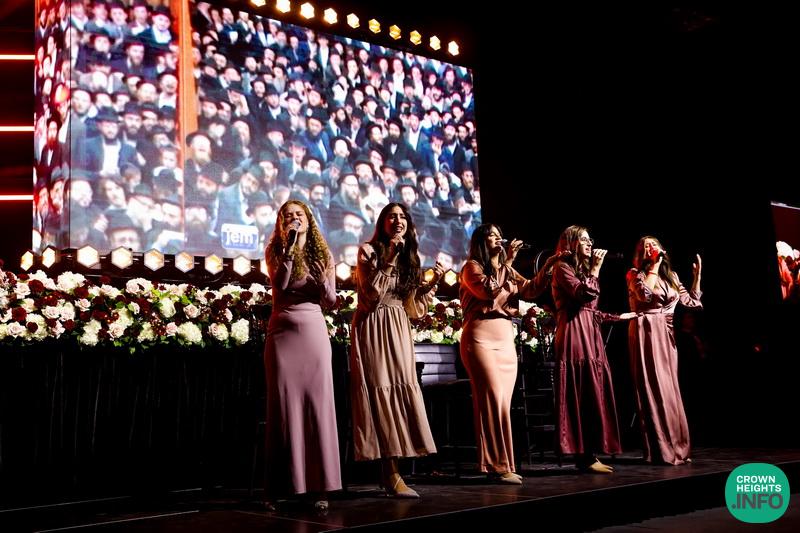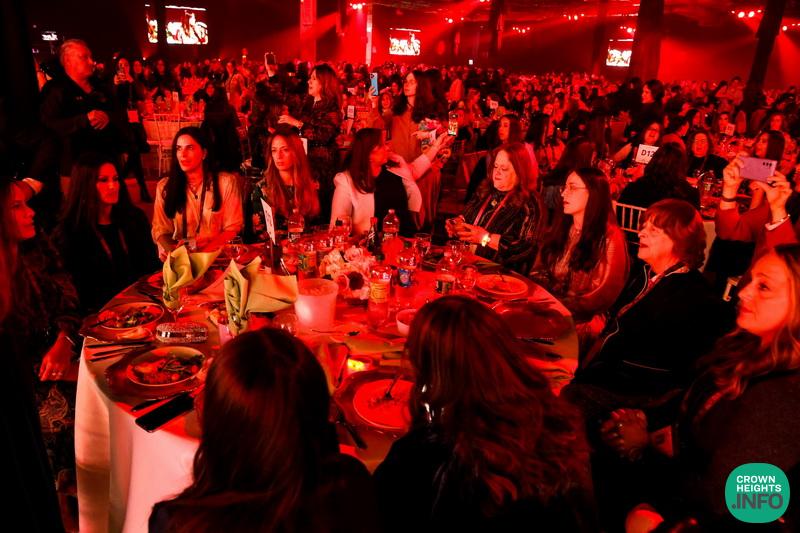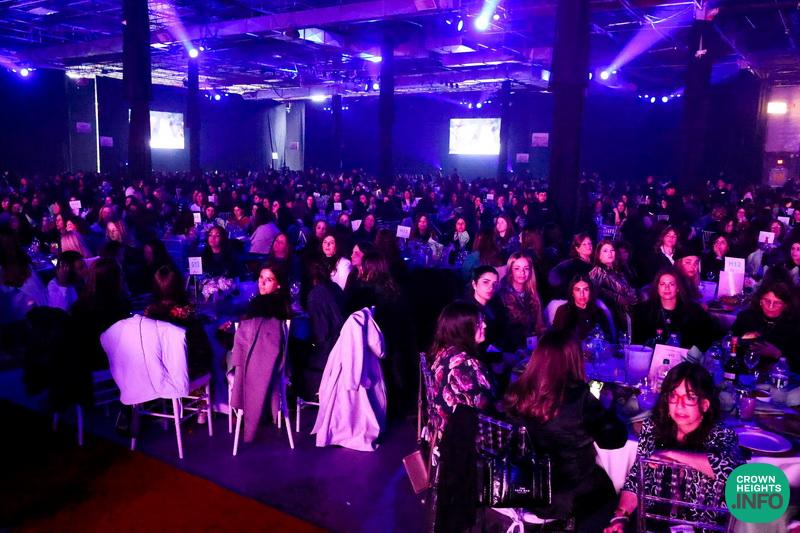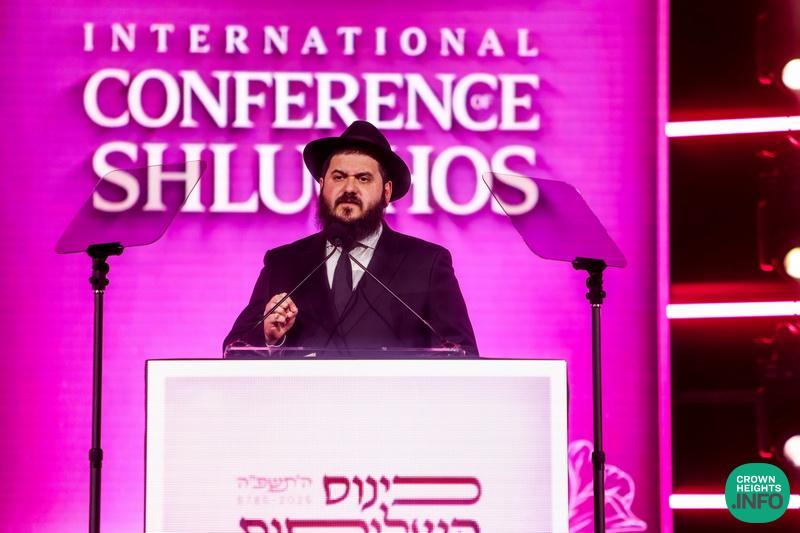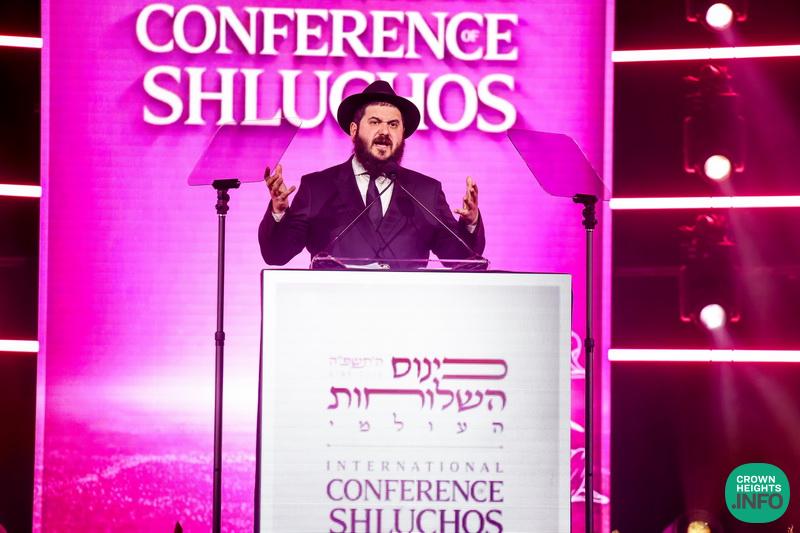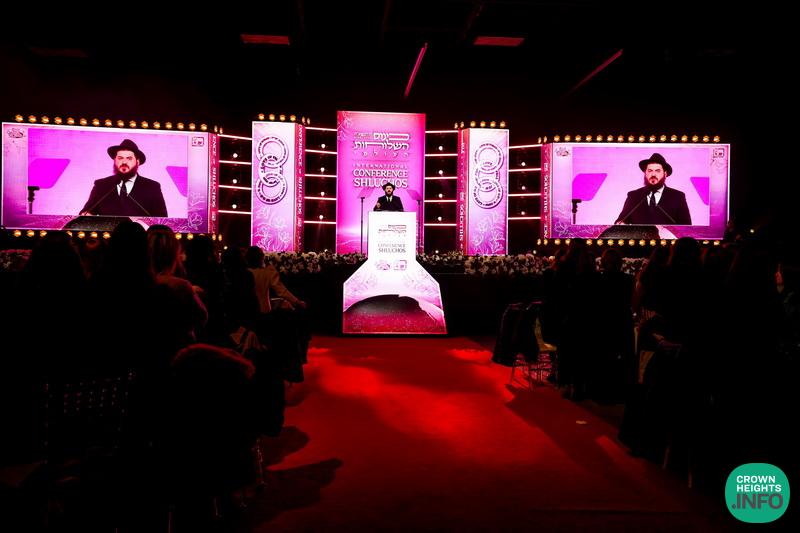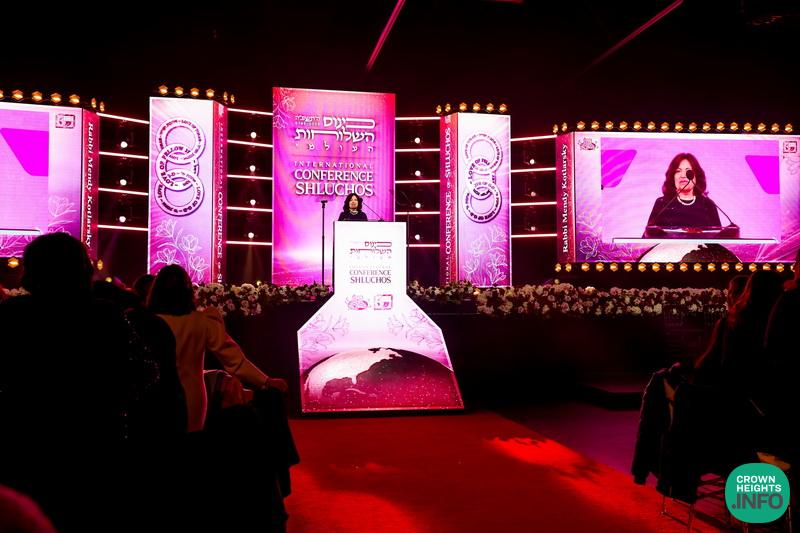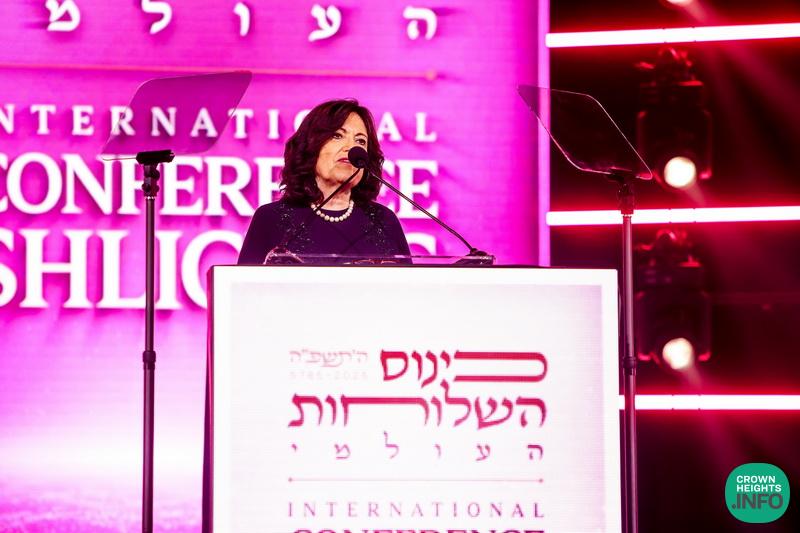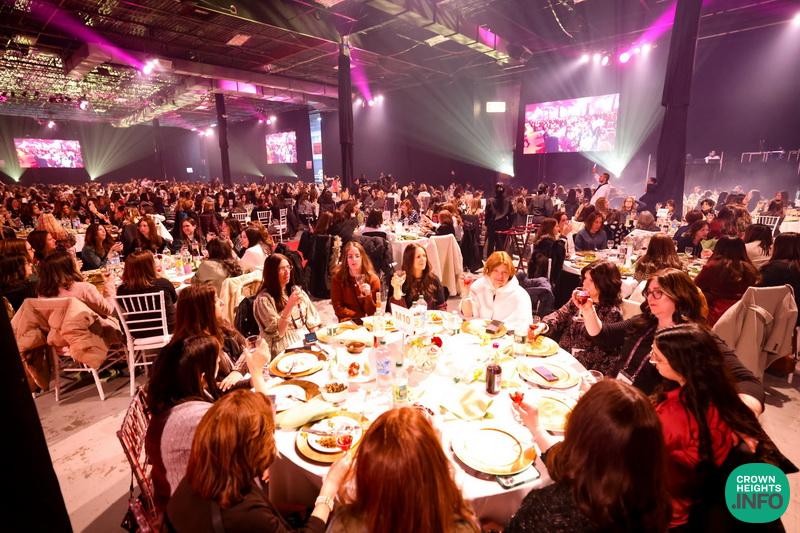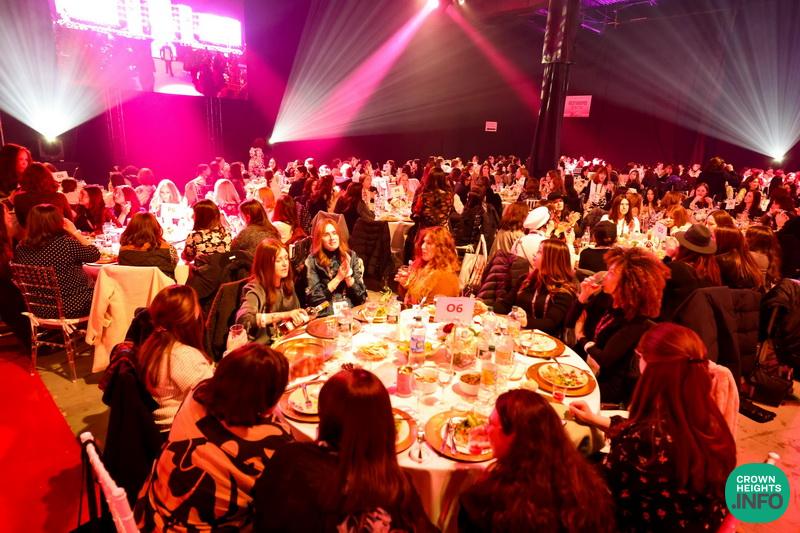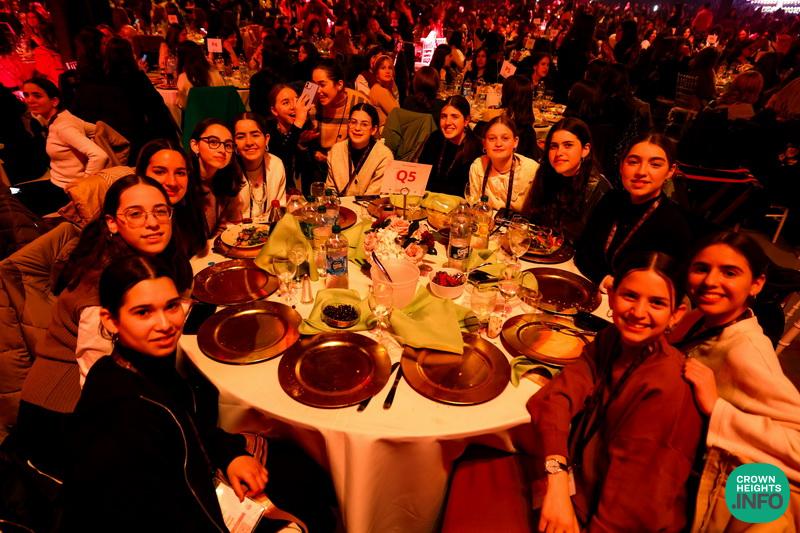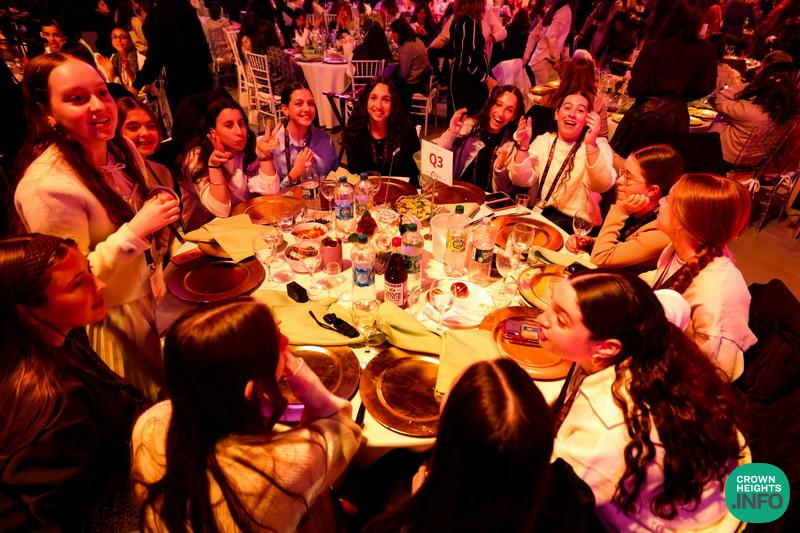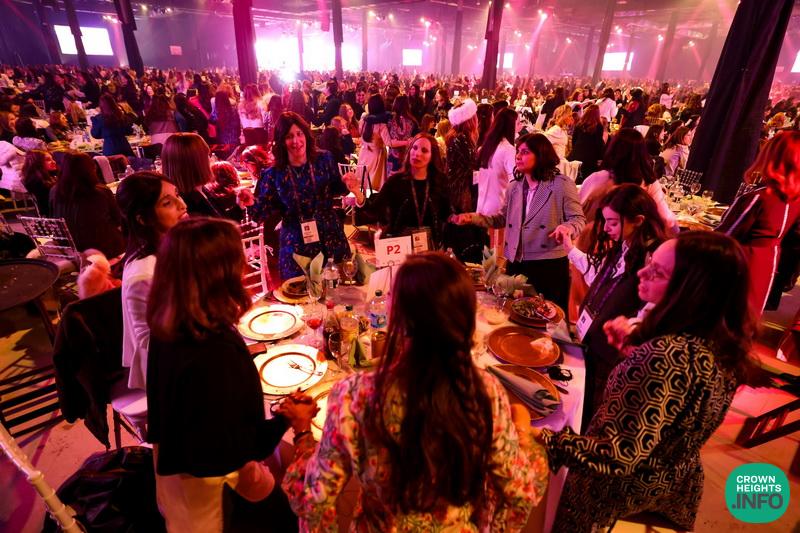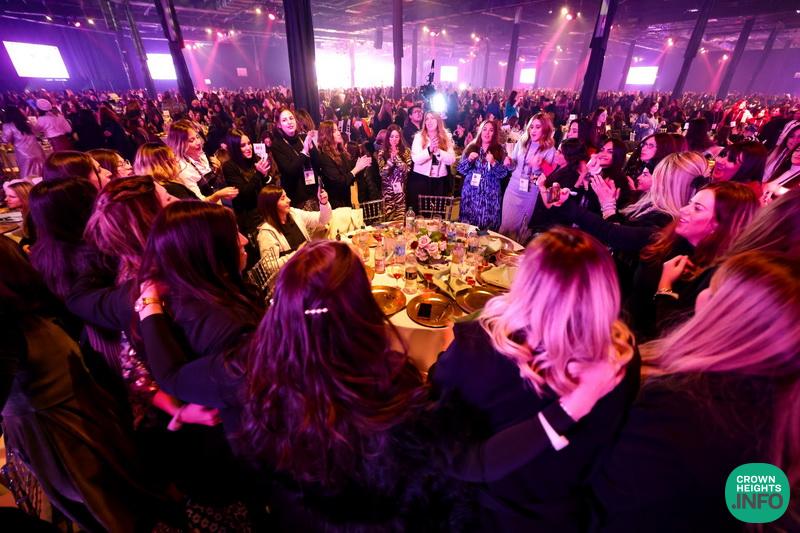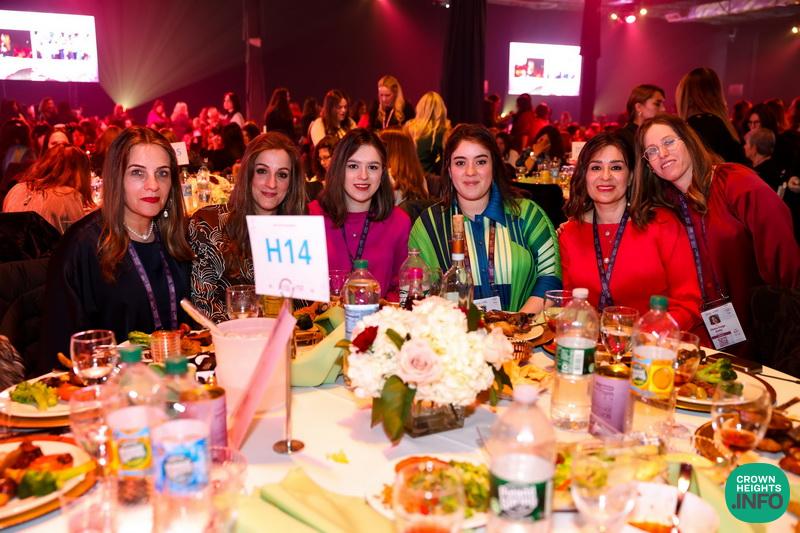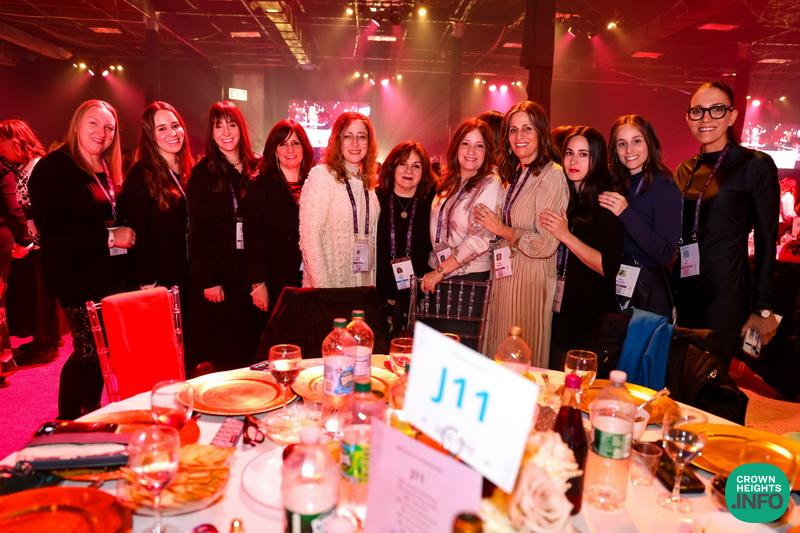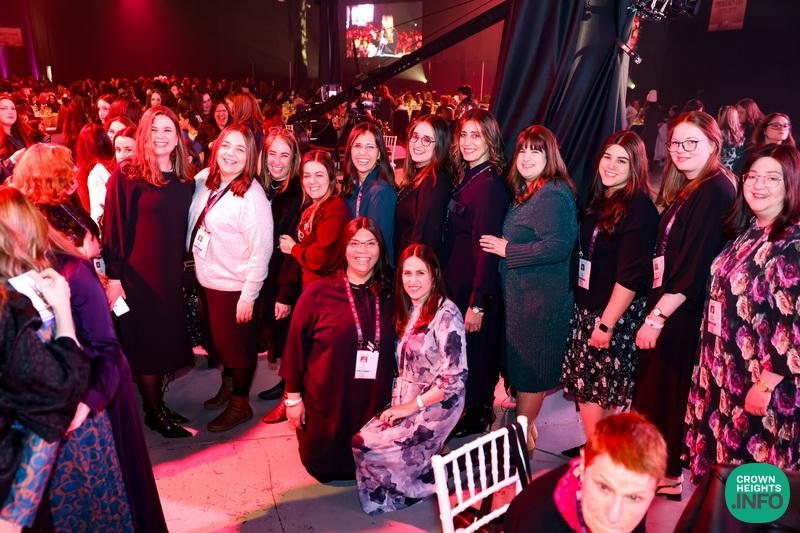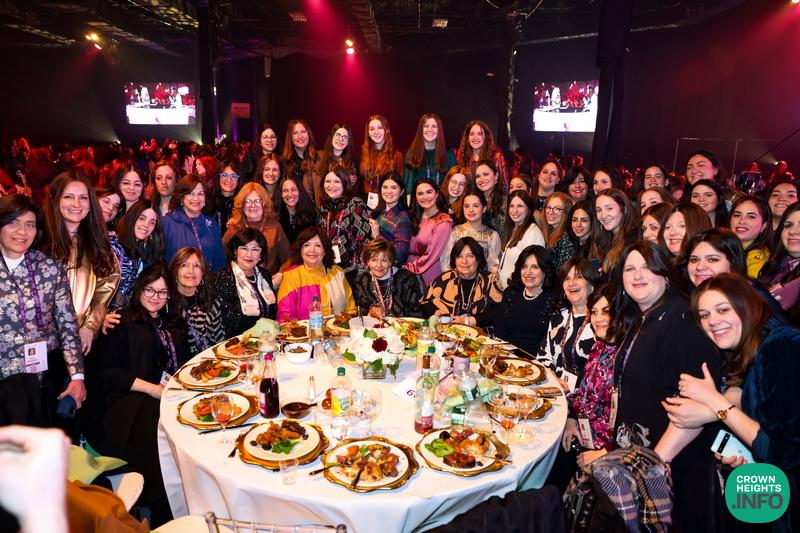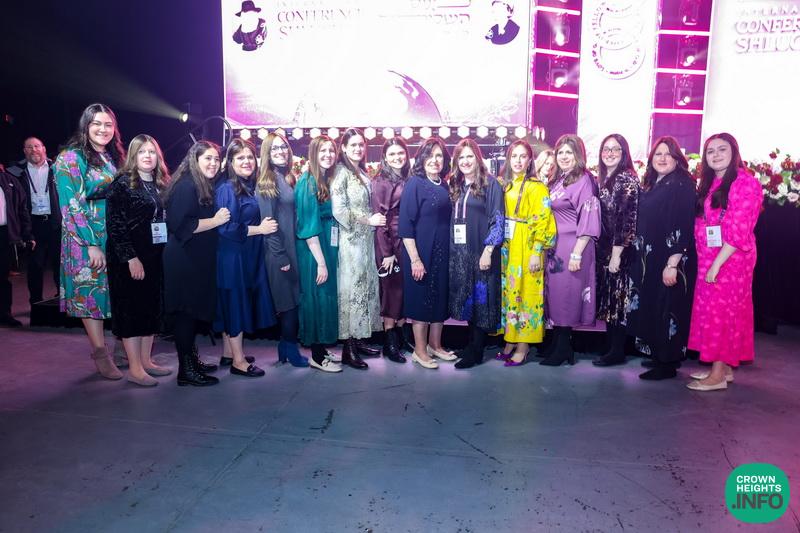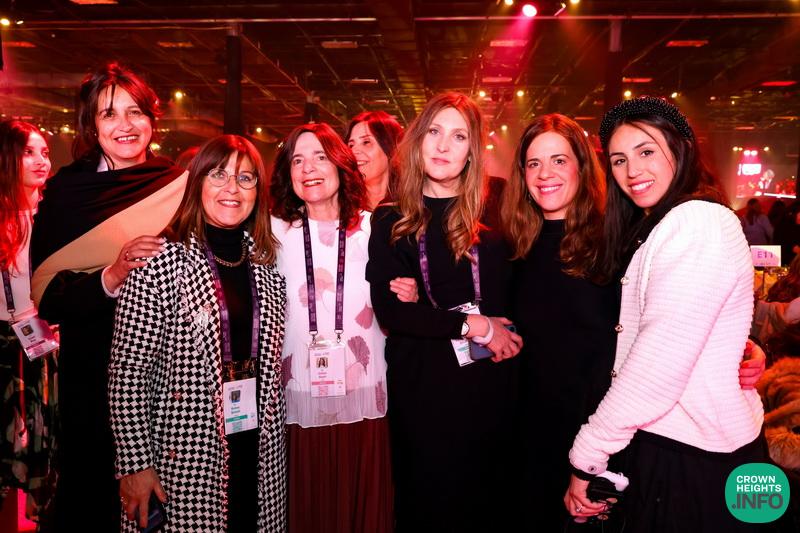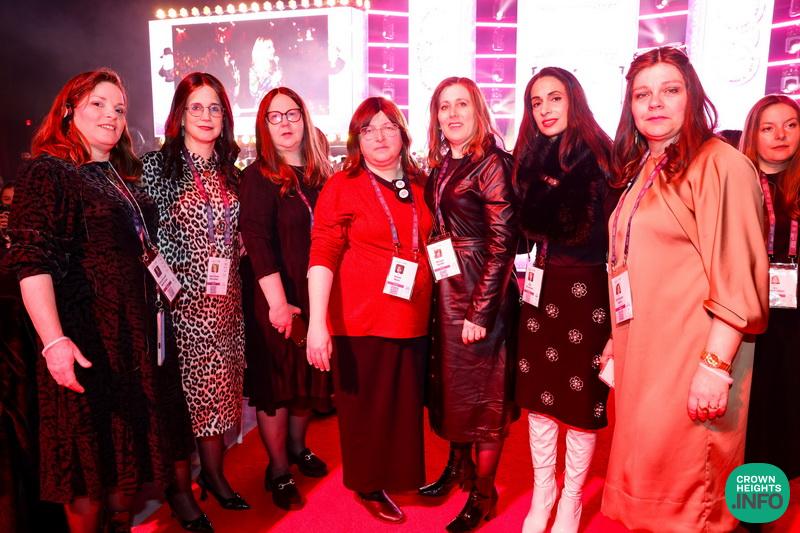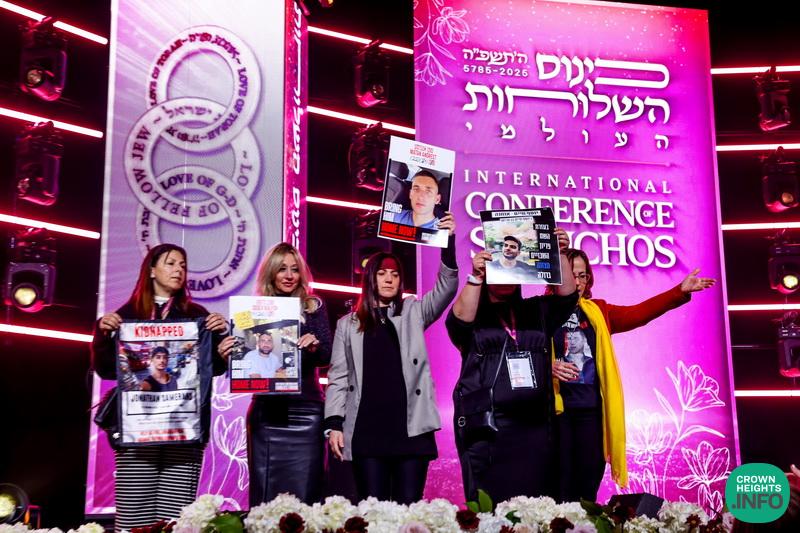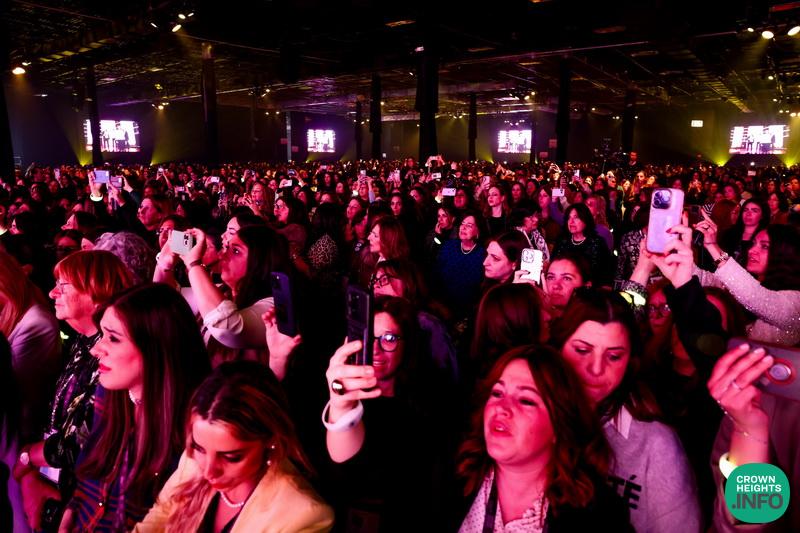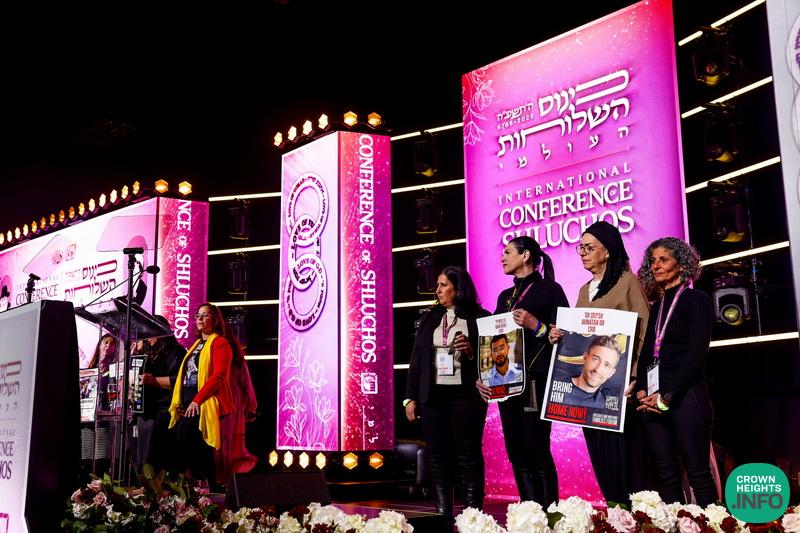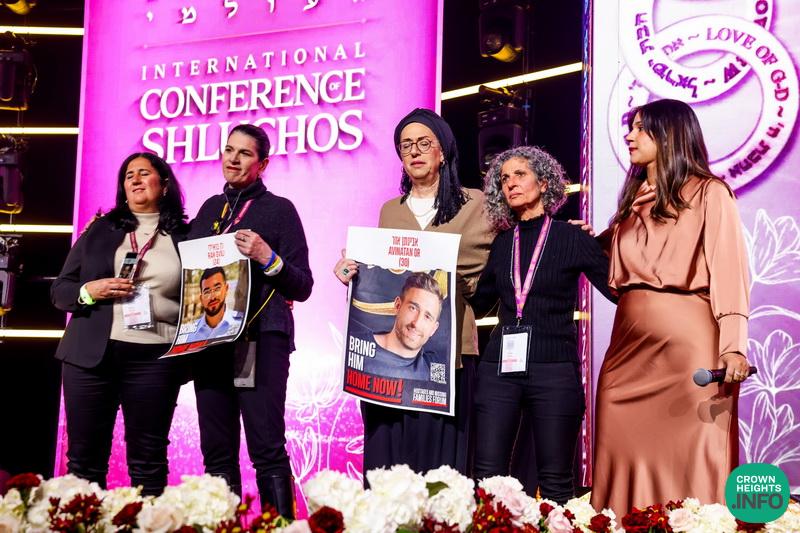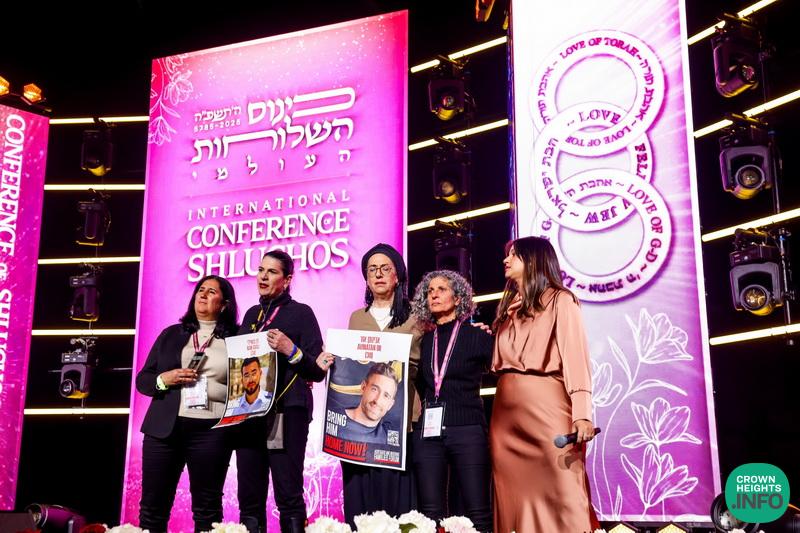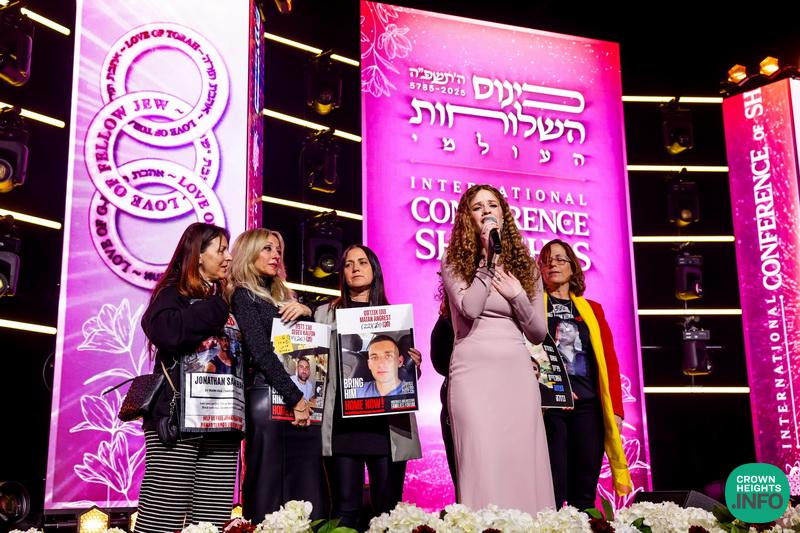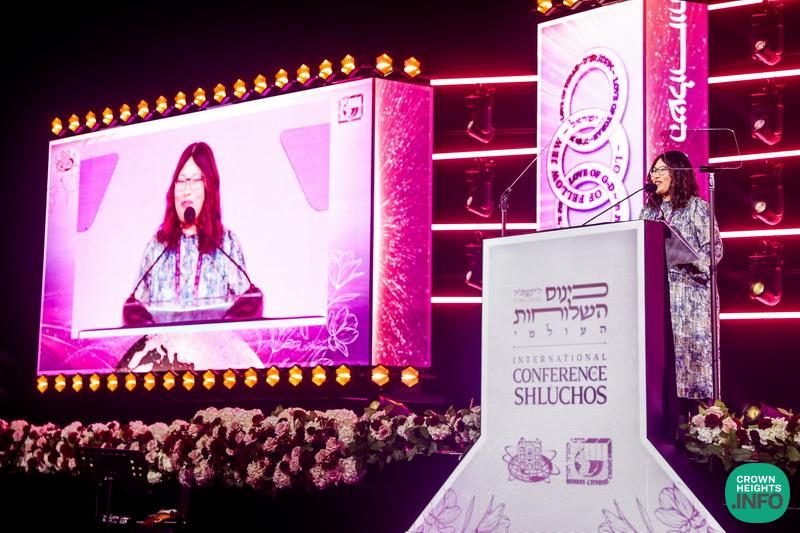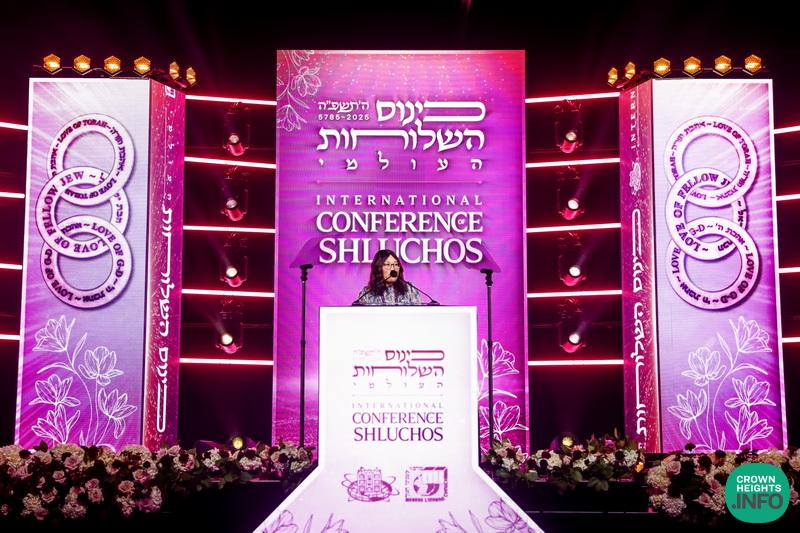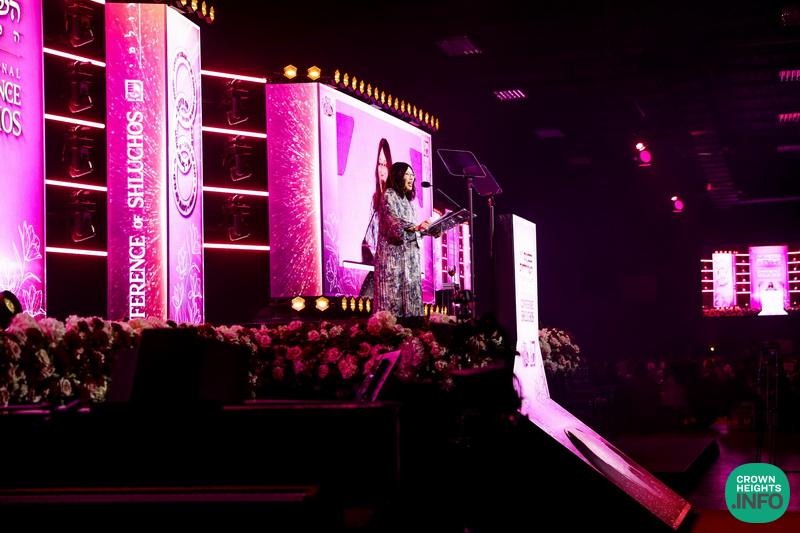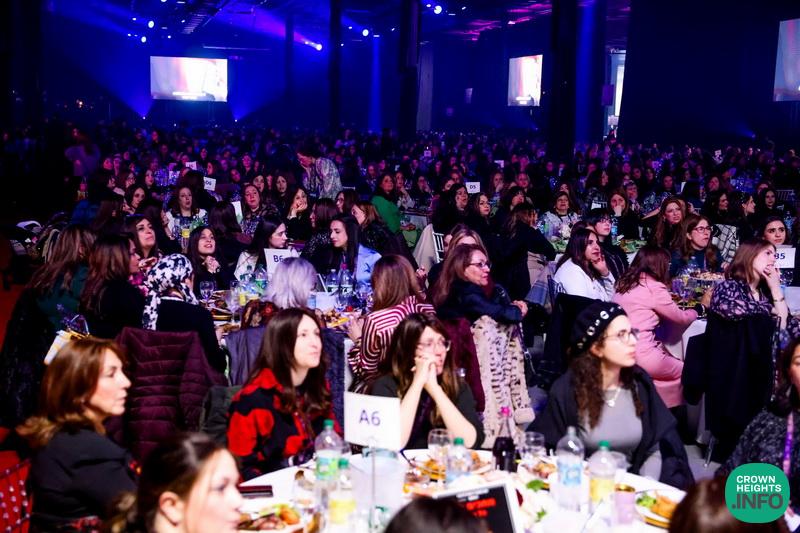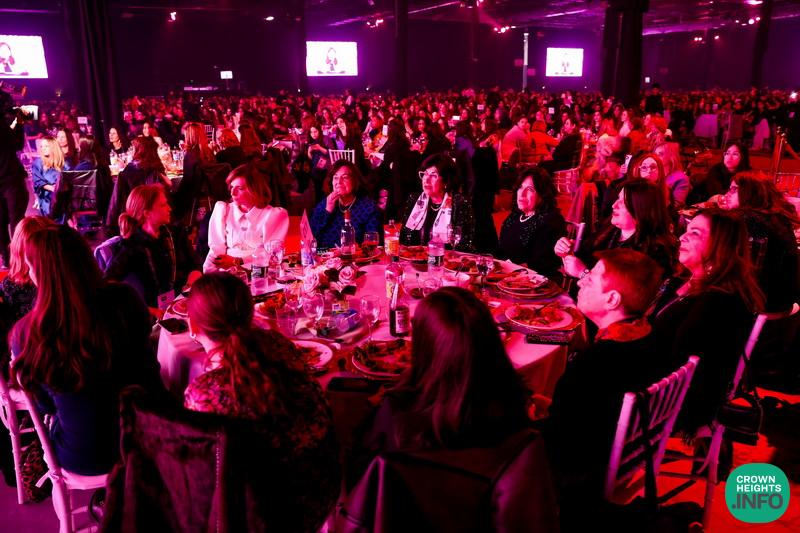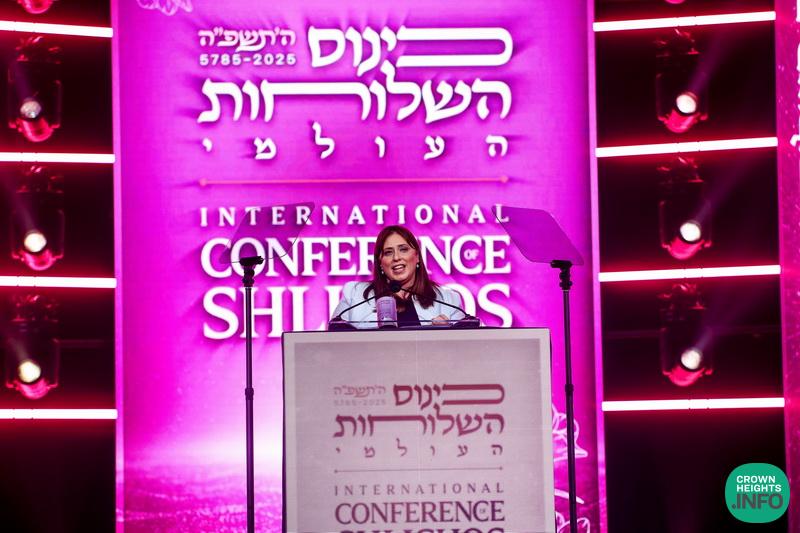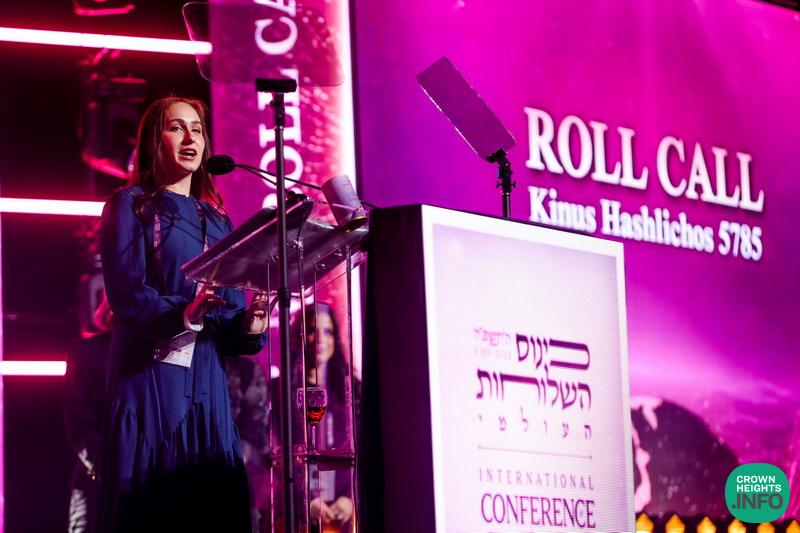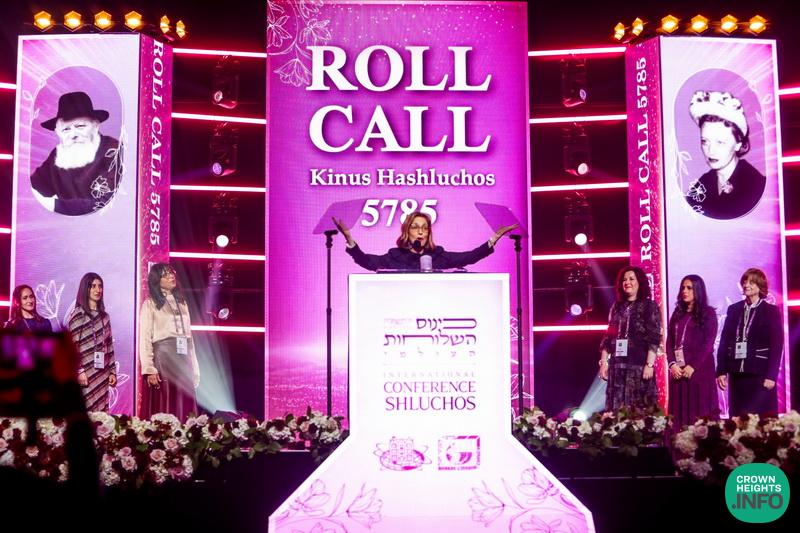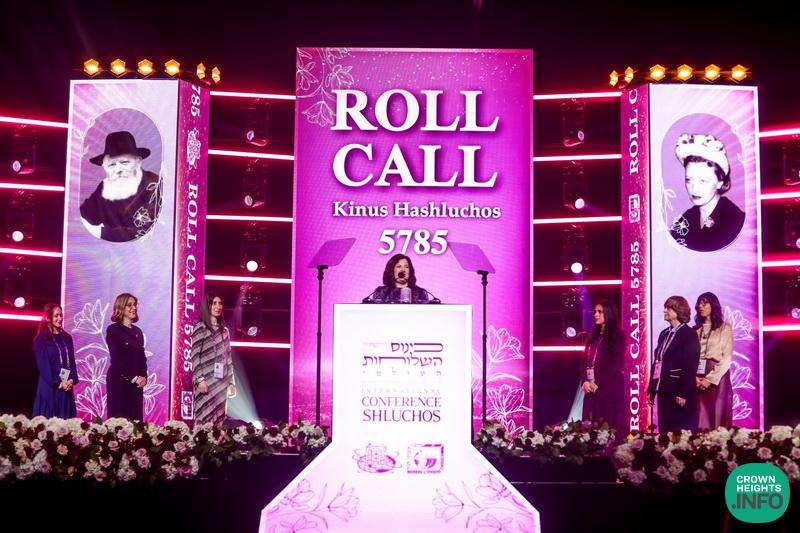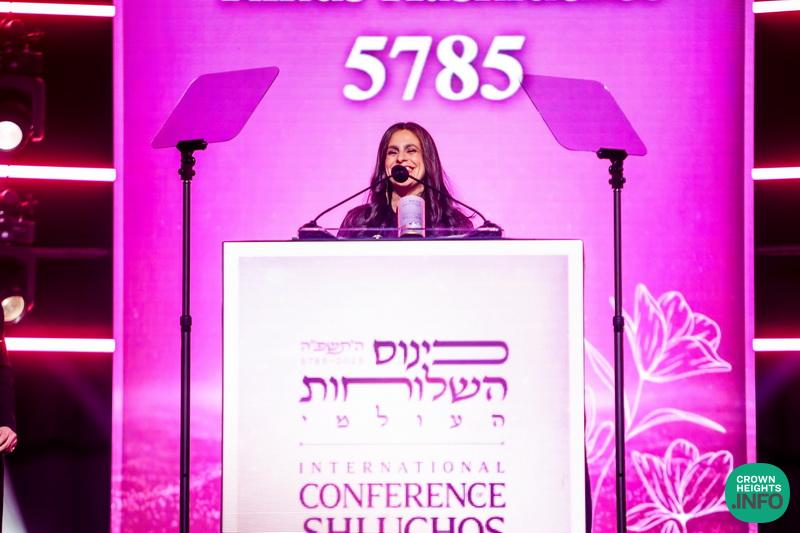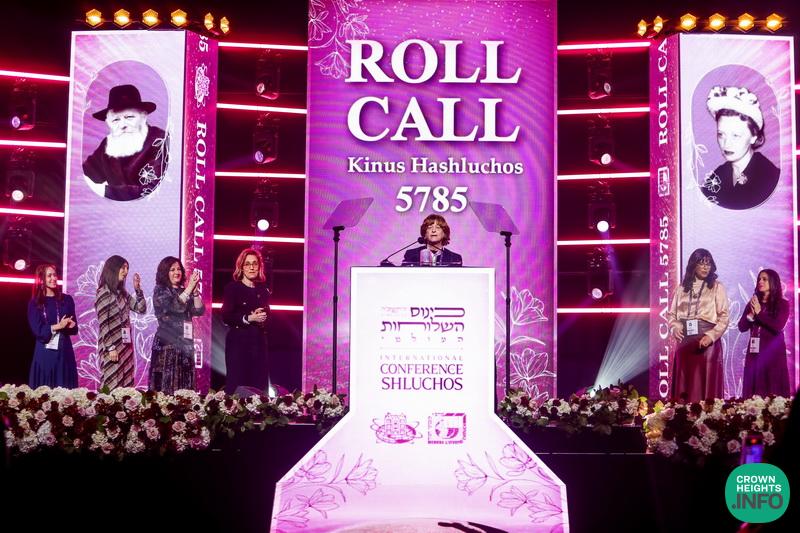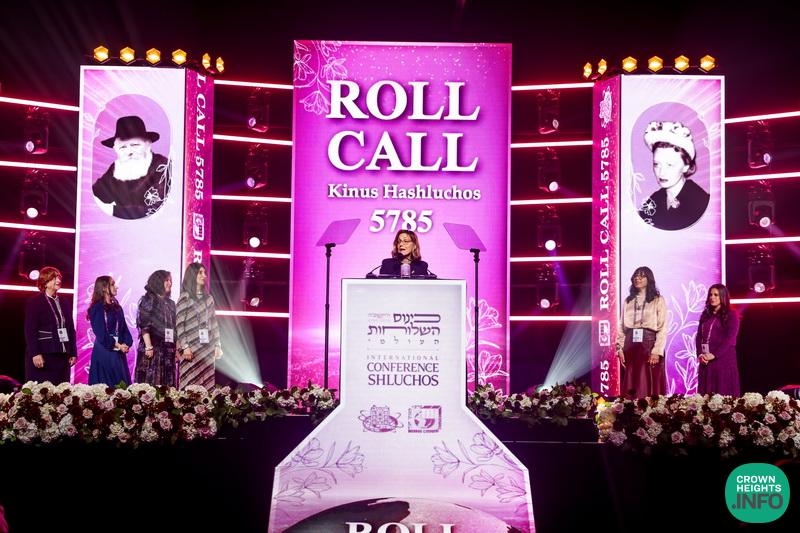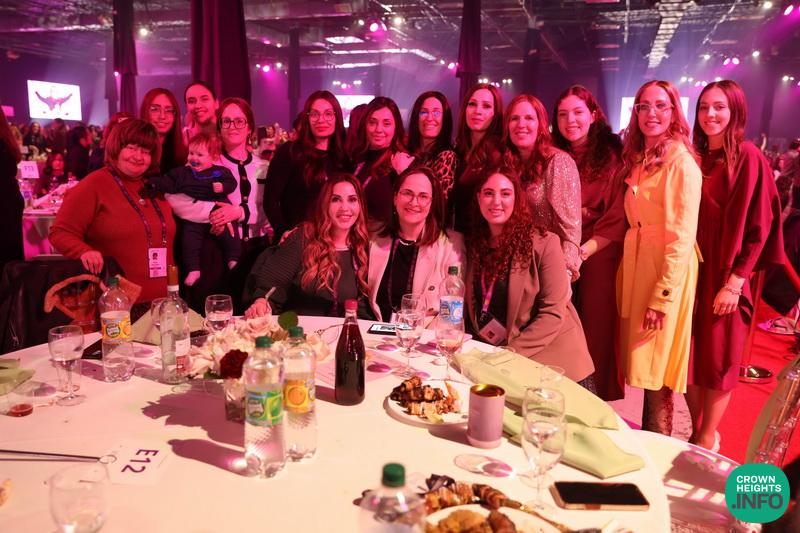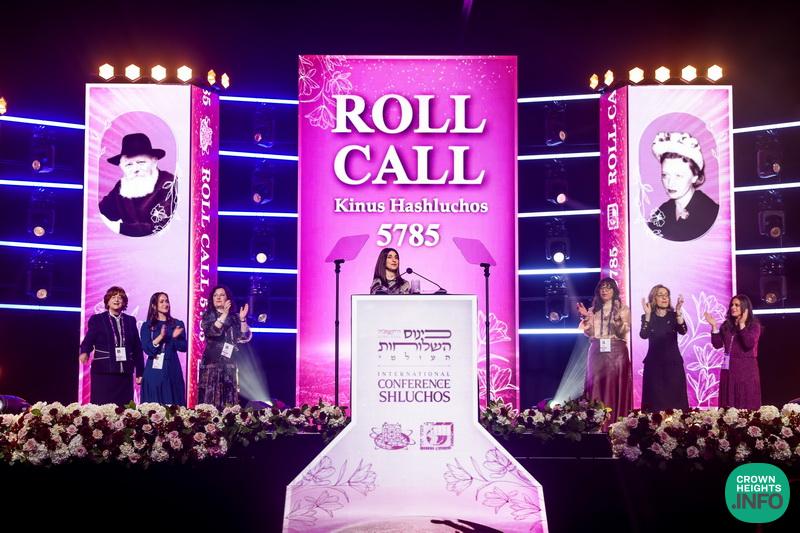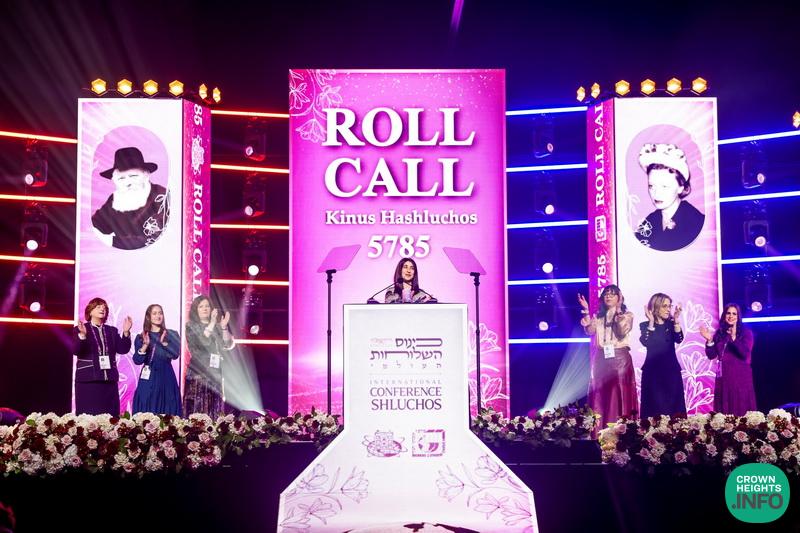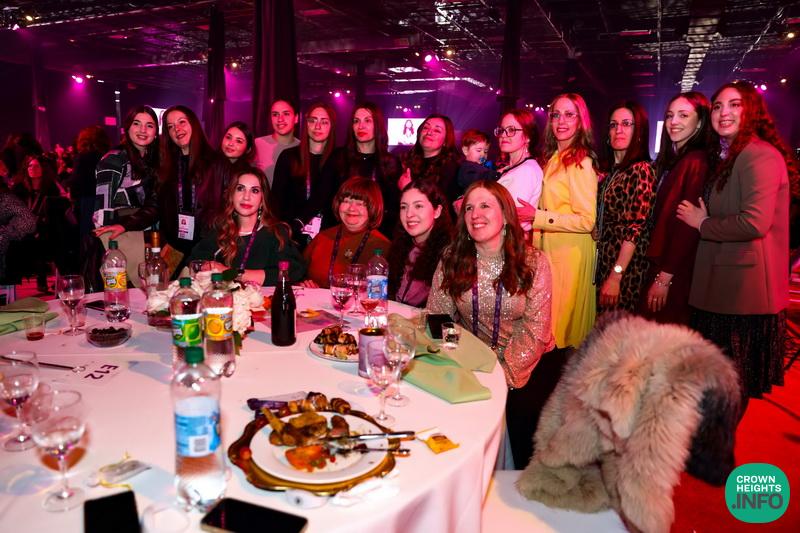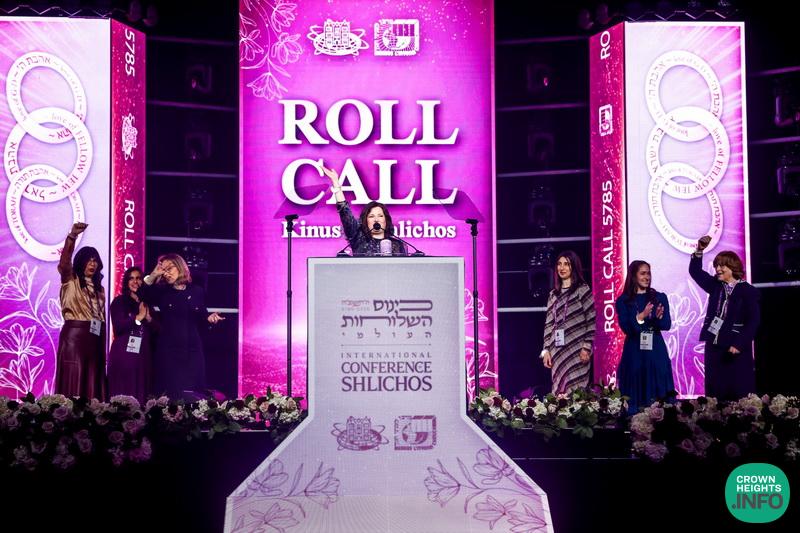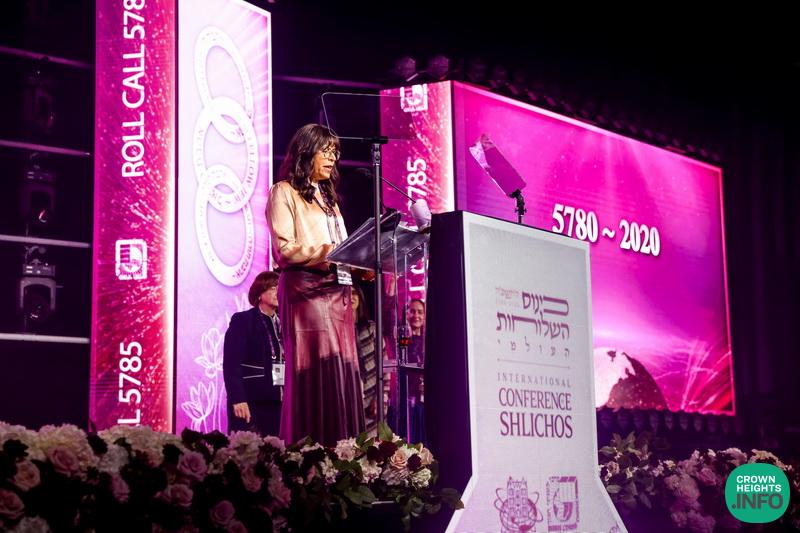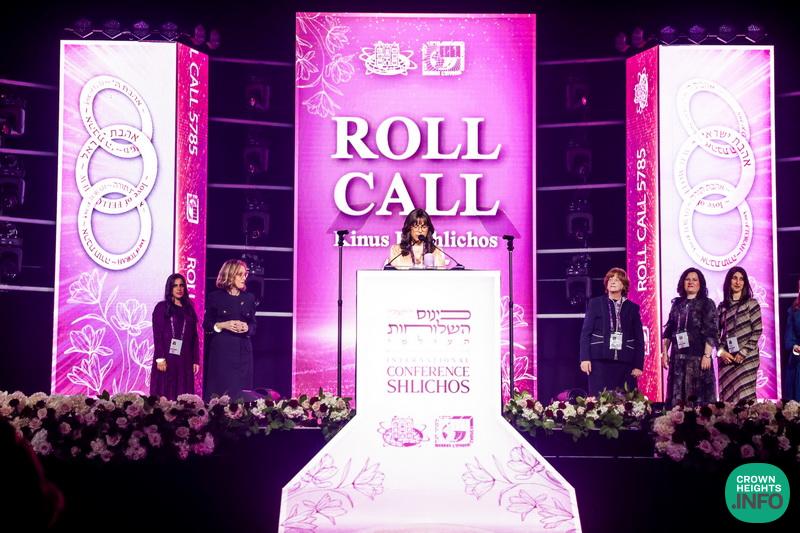
Gala Banquet of 35th International Conference of Chabad Women Emissaries
Chabad.org Staff
How do the thousands of Jewish women who make up the legions of Chabad-Lubavitch emissaries have the energy to give, teach, uplift and inspire day after day, no matter what distant point on the globe they call home? This question began the gala banquet of the 35th annual International Conference of Chabad Women Emissaries, or Kinus Hashluchos, which brought together more than 4,000 emissaries and lay leaders from around the world.
The answer, simple yet profound, was laid out decades earlier, when it all began.
“There is the love of G‑d, the love of the Torah and the love of every Jew [ahavat Yisrael], and all three of these are indeed one. In other words, one cannot separate between these loves… ,” taught the Rebbe, Rabbi Menachem M. Schneerson, of righteous memory, on Jan 18, 1951. The date, corresponding to the 10th day of Shevat, 5711, was when the Rebbe formally accepted the position of seventh leader of the Chabad movement, sharing at once with the audience in the room and the thousands listening to his words 74 years later in a convention hall in New Jersey, the mission statement of the new era.
“Since these three loves are all one, no matter which one you want to grasp, you must know that it cannot exist without the other two. Therefore, everyone must know: If you want to attain love of G‑d, it is not enough, and it will not last, without love of Torah and love of every Jew.”
Female Chabad emissaries, or shluchos, embrace multiple roles and responsibilities in their work. These too-often unsung communal leaders plan, coordinate, teach and direct massive parts of the global Jewish community’s infrastructure, while at the same time creating an inviting home atmosphere for students and travelers, businesspeople and locals. They provide warmth, advice and a shoulder to cry on, all while making sure nothing falls through the cracks.
They do it for Judaism’s three loves: The love of G‑d, Torah and every single Jew, no matter where, no matter who.
The evening’s program unfolded at the 150,000-square-foot New Jersey Convention and Expo Center, transformed for the evening into a beautiful banquet hall, and was streamed live on Chabad.org. As do all Jewish gatherings, it began with prayer, chapters of Psalms recited by Feigy Rapoport of Chabad of Mequon, Wis.; Lea Duchman of Chabad of the United Arab Emirates; and Michal Wexilshtein of Chabad of Hadera, Israel. Rapoport spoke of the power of women’s prayer, and Duchman represented the Jewish community of the UAE, where Chabad Rabbi Zvi Kogan was murdered late last year. Wexilshtein noted the presence in the great room of mothers of Jewish hostages being held captive by Hamas in Gaza, and requested all of the thousands of mothers, daughters, sisters and wives to pray in unison for the safe return of every kidnapped Jew to the embrace of their loved ones.
This was followed by a message from Rabbi Yehuda Krinsky, chairman of Merkos L’Inyonei Chinuch and Machne Yisrael, the Chabad movement’s educational and social-services arms, who served for decades in the Rebbe’s secretariat. A video tribute to Rabbi Moshe Kotlarsky, the late vice chairman of Merkos and for years the ebullient face of the Kinus, was played.
After the presentation, his son, Rabbi Mendy Kotlarsky, director of the International Conference of Shluchim, took the stage to deliver the Call of the Hour, setting the tone for the coming year with a slate of bold new initiatives aimed at deepening and expanding Chabad’s global impact.
Among the key announcements was a significant expansion of CKids after-school programs, ensuring Jewish education is accessible to more children than ever before. He shared that the program—designed to bring daily Torah learning and Jewish engagement to children attending public schools in 100 locations—has already launched in 15 communities, serving nearly 1,000 children. Applications are now open for additional locations, providing Shluchim an opportunity to bring full-time Jewish after-school programs to their cities.
Additionally, Rabbi Kotlarsky announced the seed funding for 36 new Shluchim couples, bringing the total to 86 new couples this year, in locations spanning Argentina, Kenya, Greece, Tanzania, and beyond. These new appointments, he emphasized, reflect the unwavering commitment of Chabad to bringing vibrant Jewish life to every corner of the world.
“The Rebbe’s path of authentic and unapologetic Torah-true Judaism continues to be the reason why the Shluchim and Shluchos trailblaze, innovate, and are the primary force of Jewish life today,” declared Rabbi Koltarsky. “Watching the Shluchos be there for each other, inspiring and uplifting one another and their communities, you see it so clearly—Jewish life is thriving, and the future is bright.”
He also introduced a new online seminary for Shluchos, an initiative designed to provide structured Torah learning opportunities for Shluchos worldwide, ensuring they have the time and resources to continue deepening their own spiritual growth while strengthening their communities.
Then Rabbi Moshe Kotlarsky’s wife, Rivka Kotlarsky, recalled her husband’s last visit to the Ohel, the Rebbe’s resting place in Queens, N.Y., just days before his passing. “He came to thank the Rebbe for the [privelege] of being his shliach,” Kotlarsky explained to the thousands in the room. “He thanked the Rebbe for allowing him to serve as a conduit to carry out the Rebbe’s wishes for the world of shlichus and Lubavitch throughout his lifetime. For over six decades, my husband’s guiding principle was to fulfill the Rebbe’s desire and to bring nachas to the Rebbe. To the shluchim and shluchos my husband’s message was always clear: ‘Always be grateful for the privilege of carrying out the Rebbe’s mission.’”
Faces of the Frontlines
In a series of live interviews conducted by Chabad.org’s Chana Weisberg, editor of TheJewishWoman.org and host of the Ordinary People, Extraordinary Stories podcast, and Sarah Alevsky, Chabad emissary in Cleveland, Ohio, those in the audience and watching live online heard powerful first-hand accounts of life on the frontlines of the Jewish world.
Zisi Cunin shared how after her Pacific Palisades community on the California coast was decimated by January’s devastating wildfires, she knew they needed to reopen their Chabad preschool as soon as they could. “Where are these children going to be? By Divine Providence my husband mentioned to someone we’re looking for a school, and they knew of a vacant school building … it was unbelievable,” she shared. “We got in full gear with our full maintenance staff, cleaned it up, painted it, got new furniture, and we opened up in five days.”
“A typical day we’re on campus [meeting Jewish students at our Chabad table], doing events, classes and then at night we have social events … every day of the week we have something else going on at Chabad,” explained Chava Backman, co-director of Chabad at the University of South Florida for the last 15 years. She described the post-Oct. 7th anti-Jewish protests that took place on campus, hiring security for their Chabad Center and their home, while at the same time creating a safe space for Jewish students on campus. “We knew we had to give strength to our Jewish students on campus.”
Backman was followed by Sheina Amram of Chabad of Nahariya, Israel, who together with her husband Rabbi Menachem Mendel Amram, serves the French-speaking community in the city in Israel’s far north. She shared how during times of war and missiles from nearby Lebanon, they conduct programs in a bomb shelter.
The banquet caps the conference and is a time of prayer, introspection, camaraderie and above all else joy.
Ambassadors of Light
The keynote was delivered by Elisheva Martinetti, whose Jewish story began in Jixi, northeast China, where she was born. When she was 11 years old, her mother, a born searcher, found a book about Judaism, and began exploring the religion of Abraham, Isaac and Jacob; Sarah, Rebecca, Rachel, and Leah. Soon Elisheva grew interested as well, and when she turned 15, her mother made the decision to send her to Singapore to learn about the faith. When Elisheva expressed to her mother her concern that they would be separated from each other, her mother told her: “Think about Abraham our forefather, I don’t think he cried when G‑d told him to go.”
She shared her journey from China to Singapore, then on to Sydney, Melbourne, and onto Tzfat, Israel, and London. Every step of the way, she explained, she was assisted by Chabad emissaries, women who guided her on her path first to Judaism, and then onto a Chassidic life. Today, she and her husband, Rabbi Dovid Martinetti, serve as Chabad emissaries in Milan, Italy.
“It feels like a dream to be standing here,” she said through tears, the audience rising to their feet in a moment of heartfelt emotion.
“Thank you, shluchos, for sharing the authenticity of G‑d’s Torah, and introducing me to Judaism as a young girl. Thank you for your warmth and sense of family I experienced in your homes. And thank you for introducing me to the boundless wisdom of Torah and Chassidut,” she said. “My story is personal, but its message is universal. No soul is ever too far. Every connection we make with someone connects them to their Source. It takes root in their neshamah, and with time, it will grow and flourish. Never underestimate the power the Rebbe has given you to reach another person, just by being you, even by walking down the street as a shlucha.”
She was followed by Tzipi Hatovely, Israel’s ambassador to the United Kingdom, who noted that while she had broken ground as the first woman in her position, the Rebbe had sent female ambassadors decades earlier than anyone else.
Hatovely spoke about her memories of seeing the Rebbe as a 12-year-old girl, when her father brought the family to the synagogue at 770 Eastern Parkway, and receiving coins for charity, as well as the Tanya class her mother used to take her too.
She proudly noted that her first speech after first being appointed deputy foreign minister was not about geopolitical strategy, but words of Torah. She chose to speak about the medieval master commentator Rashi’s first explanation on the Torah—so often cited by the Rebbe in his many talks on the integrity of the Land of Israel—in which Rashi explains the reason why the Torah begins with G‑d’s creation of the earth: “For if the nations of the world should say to Israel, ‘You are robbers, for you conquered by force the lands of the seven nations [of Canaan],’ [the people of Israel] will reply, ‘The entire earth belongs to the Holy One, blessed be He; He created it (this we learn from the story of the Creation) and gave it to whomever He deemed proper. When He wished, He gave it to them, and when He wished, He took it away from them and gave it to us.”
Haaretz panned Hatovely’s speech, dismissing it as “diplomacy according to Rashi,” but Hatovely says her career has ever since been guided by the approach outlined by the Rebbe. “If you believe in G‑d and in the truth of the Torah, then you understand that the Land of Israel belongs to the Jewish people,” Hatovely declared.
Saluting the Rebbe’s emissaries around the world, including Rabbi Mendel and Chai Cohen of the Chabad St. John’s Wood community, which she and her family are a part of today in London, she made special mention of the 1,400 or so Chabad emissary women serving communities through the length and breadth of the Land of Israel.
The Four Corners
Representing the four corners of the world G‑d told Jacob his descendants would spread out to, west and east, north and south, a video presentation brought the gathered the stories of women serving as Chabad emissaries in the literal ends of the earth. Fraidy Klein shared insights from life serving the Jews of Bariloche, Argentina, while Ida Kolpak spoke of Jewish life in Stalin’s “Jewish homeland” of Birobidzhan, Russia; Chani Wolf spoke of the dark winter and endless summers extremes of life in Fairbanks, Alaska, and Odeya White explained how she never expected to devote her life to the Jews of Perth, Australia. All the women agreed that they’d have never ventured to their parts of the world had it not been for the vision and blessing of the Rebbe, whose call they feel proud to answer by serving at their postings.
The evening concluded with the iconic Roll Call. Chana Wagner, who recently moved to southern Portugal with her husband and two young children, represented emissaries who’d departed for their localities since 2020. She was followed by Chaya Fuss, of Fremont, Calif., representing emissaries who’d taken their posts between 2010-2020; Mussy Litzman of Seoul, South Korea, welcoming those who’d gone out between 2000-2010; Chani Labkovsky of S. Paulo, Brazil, to those of the 1990s; Rivkah Yurkowicz of Melbourne, Australia, to those of the 1980s; Hinda Gerlitzky, who established Chabad of Tel Aviv with her husband in the 1970s; and Hindy Lew, who was dispatched to England by the Rebbe with her husband, Rabbi Shmuel Lew, in 1965.
“Feel the power in this room,” Yurkowicz called out after the Roll Call naming Chabad presences in state by state, country by country, had concluded. “It radiates outward, far beyond these walls, the entire world is represented right here, right now. Let’s channel this energy into action and finish the mission of bringing Moshiach now!”
Photo Credit: Itzik Roitman/Kinus.com

